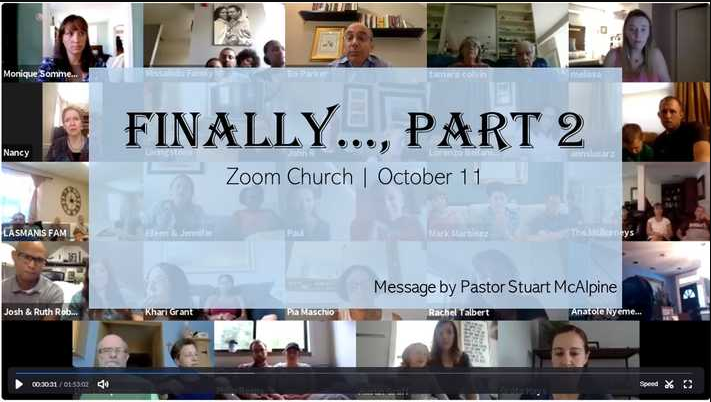A powerful Celebration Gathering by different Speakers and Congregants to honor Stuart & Celia McAlpine for their service to COSC
ALL THINGS NEW - CONSECRATION SERVICE FOR PASTOR JOSH ROBINSON
Pastor Josh Robinson is consecrated for his special service to the Church in obedience to Christ the Savior of the world bringing us New Life through Him.
FINALLY..., PART 2
Join for our online service. This is the second part to a message Pastor Stuart did on powers and principalities.
ELDERSHIP
A word from Pastor Stuart McAlpine on Eldership and church oversight.
BACK TO CHURCH SUNDAY
Join for our online service. The sermon starts at 12:30.
TO THE CHURCH IN EPHESUS
Dearest family,
Last Sunday we looked at the first of the letters to the churches in Revelation, the one to Ephesus. I spent quite a bit of time looking at the question: how and why does love grow cold? But for the purpose of this week’s pastoral letter, I want to reiterate the refrain that ended the letter, which will be repeated in all the others, though each one will contain a different promise. “He who has an ear to hear let him hear what the Spirit says to the churches. To him who overcomes, I will give the right to eat of the tree of life, which is in the paradise of God.” (v7) This is what is left ringing in your ears. This is a deliberate repetition of the same words with which Jesus began his ministry as recorded in the parable of the sower and the seed.
Our text and series raises huge questions about the quality of the church’s hearing. The Bible has so much to say about hearing, both good and bad.
About good hearing:
• There is that lovely listening ear that Isaiah speaks about: “He wakens my ear to listen morning by morning.” (Isa. 50:4) It says this is the word that sustains the weary, that teaches us.
• There is an ear that is shut to evil (Isa. 33:15) This is the one who walks righteously.
• There are ears that are simply described as “opened by the Lord” which saves the hearer from rebellion and drawing back. (Isa. 50:5) “My ears you have opened” (Ps. 40:6) Response is “Here I am!” “Speak for your servant is listening.” (1 Sam.3:9)
• There is the ear that hears and receives reproof and correction (Pvbs. 15:31)
• There is the attentive ear. “They hung on his words.” (Lk. 11:48) “Lydia attended” (Acts 16:14) The fruit of that attentiveness was: her household, a church, barbarian Europe were reached from Philippi!
• There is the obedient ear that Jesus blessed.
• We are exhorted to be “swift to hear” (Jms.1:19)
• We are taught how to hear: carefully, diligently (Dt.15:5; 11:13)
• So many encouragements in scripture to good hearing: incline your ear (Pvbs. 2:2), bow your ear (Ps. 5:1), apply your ears to instruction (Ps. 23:12), open your ears to the words of his mouth (Jer. 9:20) let these things sink down into your ears (Lk. 9:44) go near to the house of God to listen (Eccl. 5:1) faith comes by hearing and hearing by the word of God (Roms. 10:17)
• We are invited to take responsibility for how we hear and to ask for good hearing: “I will incline my ear”(Ps. 49:4) “Let me hear thy voice…for sweet is thy voice.” (Song of Sol 2:14) Good hearing is the response of love.
• Do your own study on the fruits of good hearing: faith I’ve already mentioned, also instruction and wisdom. When we hear rightly God is glorified (Acts 21:20) Both blessings and cursings are utterly determined by how we listen. (Dt. 28)
About bad hearing
• heavy, dull ears that will not understand ((Isa. 6:10)
• ears that have not been opened (Isa. 48:8)
• ears that are deliberately stopped to anything they don’t want to have to deal with (Pvbs. 21:13) Stopped to injustice’s cries (Zech.7:11)
• ears of fools that do not hear (Jer. 5:21)
• Jeremiah talks about the uncircumcised ear that finds the word of the Lord offensive, that reacts against God’s commands. Stephen quotes this in his final sermon and he tells them that the mark of an uncircumcised ear is resisting the Holy Spirit. (Acts 7:51) Six verses later they can take no more and his condemnation of their hearing literally gets him killed. It says “they covered their ears” proving what he said about their hearing was right!
• Ears that choose not to be attentive to the Lord produce bad results: stubborn inclinations, go backward not forward (Jer. 7:24)
• Ears that resist correction – truth perishes (Jer. 7:28)
• Ezekiel struggled with an unlistening audience in the face of calamity. “Ears to hear but do not hear.” (12:2) There is a terrible symmetry a few chapters later when it is prophesied that the enemy will overcome them and cut off their ears. (23:25)
• Paul talks of the great dangers of an “itching ear” influenced by personal desires, wanting to hear what they want to hear. (2 Tim. 4:3) ears that turn away from the truth. (v.4)
• Israelites actually said at Horeb “Let us not hear the voice of the Lord.” (Dt.18:16)
• Ears of the scorner, the cynic (like Sarah laughing) Pvbs.13:1
• Romans talks of those (Israel) who cannot hear because there is a spirit of stupor on them (11:8)
• The gospels identify those who did not hear because they chose to be offended.
• It’s interesting but you’ve only been reading the Bible 5 minutes and you encounter man’s first responses to hearing: wrongly (to the serpent and sinning) and wrongly again to the voice of God – they heard…they hid. (Gen. 3:8) The history of hearing that begins in Genesis ends in Revelation 22:17 “Let him who hears say Come”
If ever there was a day to listen and hear what the Spirit is saying to the church this is it. We’re in the book of Revelation as the world falls apart, the same book that prophesies in the end times that there will be a globalization of the economy, of government and of religion. If you don’t believe or perceive how far we are in to that inevitable process then you are not only not listening but not looking. So let’s take heed to what this word teaches. From beginning to end, it gives reason after reason why we either don’t listen or cannot hear: pride, untruth, self-satisfaction, rebellion, disobedience, idolatry, unbelief, cynicism, shame, unconfessed and unrepented sin, unteachableness, distraction, loving the sound of our own voice more than his, unbelief, willfulness, stubbornness, offence. Our text is telling us to hear what the Spirit says, so we cannot afford in these days to be dull of hearing for any of these reasons.
There are three things that would be good for our ears:
1. In Ex. 21:6 and Dt.15:17 we read of a practice that was the piercing of the ear. It’s the root of the idea of an “earmark” that simply signifies ownership. Has your ear been spiritually pierced? Are you unquestionably the Lord’s servant who will not, cannot hear and entertain any other offers for the stewardship of your life? Are you vulnerable to other voices (Did God really say?) Do you have ears for his voice only? Is your hearing consistent with your confession of his lordship?
2. In Ex. 29:20 we read of another practice related to the ears. Blood was put on the ears of the priests. We are all a royal priesthood. It signified consecration, being set apart to hear and obey whatever the Lord said.
3. But what if you’ve hearing loss? What if you’re deaf, if not totally, partially to certain frequencies of His love and his commands. What if there are things that you will not or cannot hear but you should? If there’s one thing Jesus specialized in it was deafness. Remember the healing of the deaf mute for example? By the way, spiritually, our lack of hearing always results in a lack of speaking. We speak those things that we have heard. Where little has been heard from the Lord there is little to share. Where there is no listening there is no learning. Maybe you need the Lord’s fingers in your ears as it were. Maybe you need to hear just one word: “Ephphatha!” (Mk.7:34) Be opened! Maybe you need to pray afresh with the psalmist, “Cause me Olord to hear your loving kindness.” (Ps.143:8)
Whoever has ears to hear, let them hear!
Pastorally yours,
Stuart
https://www.christourshepherd.org/pastlet.htm (and follow links to download MP3 audio of sermon)
SEVEN CHURCH INTRODUCTION
Dear Church Family,
We began a much-anticipated teaching series on Sunday titled “Biblical Sexuality: Some Considerations”. The anticipation of this series has been with some fear and trepidation. That is not just because sexuality is a very personal and therefore a sensitive subject. . It is also because it is in the area of sexual morality that the traditional understanding of Biblical ethics is the most at odds with our culture today. In a nutshell, the traditional understanding is that the Bible teaches that sexual relations are for a marital relationship between a man and a woman and should not be practiced outside of that. And this understanding differs markedly from the perspective of our surrounding secular culture. In the message on Sunday, I explored the perspective on sexual ethics in our secular culture and the challenge that this presents to Christians. I quoted from a recommended book, Sex and the iWorld by Dale Kuehne (correctly pronounced “Keen” by the way).
The proverbial elephant in the room for this topic is the controversial issue of homosexuality, so I spent much of the time on that issue and the challenge it presents to us. (You will need to listen to the message online as I will not be trying to summarize it hear). However, the teaching series is about sexuality in general and will explore the importance and implications of how all of us think about and live out our sexuality. Future messages will include examining how biblical authors understood and related to the cultural perceptions of sexuality that they encountered, studying the foundational passages in the Genesis account of creation, considering a healthy theology of our physical bodies, sexuality and singleness, and sexuality and marriage. We will return to specifically addressing the topic of homosexuality again toward the end of the series.
This should not be viewed as a neatly packaged COSC teaching on Biblical Sexuality. This issue is very complex with many different angles and confusions. There is simply not time enough to include everything or even offer thorough explanations for what we will include. This is a topic that we need to discuss and wrestle with as a community. This series offers considerations for that wrestling. Stuart and I cannot do all of the work for you. All of us need to “think man think, sweat baby sweat.”
Stuart and I would like to engage with your questions and reactions to the messages so we know what we might need to clarify or explain more thoroughly. We welcome and value your e-mails. We have also set up a link for you to communicate anonymously if that would be more comfortable for you.
https://docs.google.com/forms/d/1OdmCupAlkylPafMuXhwBUFJrkELZ0JgyEbdFJ6CF3xA/viewform
Homegroups will be discussing the messages with questions that we will be providing. The purpose of these discussions will be to allow people to wrestle with these considerations together. Our goal is the goal of Paul’s prayer for the Colossians in 1:9-10 And so, from the day we heard, we have not ceased to pray for you, asking that you may be filled with the knowledge of his will in all spiritual wisdom and understanding, so as to walk in a manner worthy of the Lord, fully pleasing to him, bearing fruit in every good work and increasing in the knowledge of God. We believe that the Holy Spirit uses discussion to accomplish this within and amongst us. It is very important that everyone feels the freedom to express their perspectives and questions, especially where there might be disagreement. We want to have the mind of God, but we are all in process of attaining that, none of us have arrived. The more that we seek to understand one another when we do disagree, the more we will all grow in wisdom and discernment. So, when encountering someone with a different perspective, we do not have to agree with that perspective in order to value its contribution to a discussion. We should believe that the more fully we understand different perspectives, the more we will be able to sharpen our own and be more fully aligned with the mind of God.
May the following passage be the guide to these homegroups discussions, James 3:17-18, But the wisdom from above is first pure, then peaceable, gentle, open to reason, full of mercy and good fruits, impartial and sincere. And a harvest of righteousness is sown in peace by those who make peace.
Pastorally yours,
Bo
https://www.christourshepherd.org/pastlet.htm (and follow links to download MP3 audio of sermon)
ENCOURAGEMENT TO CHURCH Reg SINGLES ISSUES PART 2
"Be on your guard; stand firm in the faith; be courageous; be strong." "What, then, shall we say in response to these things? If God is for us, who can be against us?" "Therefore encourage one another and build each other up, just as in fact you are doing."
ENCOURAGEMENT TO CHURCH Reg SINGLES ISSUES PART 1
"Be on your guard; stand firm in the faith; be courageous; be strong." "What, then, shall we say in response to these things? If God is for us, who can be against us?" "Therefore encourage one another and build each other up, just as in fact you are doing."
THE PURPOSE OF THE CHURCH
The mission of the Church is to prepare the way for the final establishment of the Kingdom of God on earth. Its purpose is, first, to develop in men's lives Christ-like attributes; and, second, to transform society so that the world may be a better and more peaceful place in which to live.











